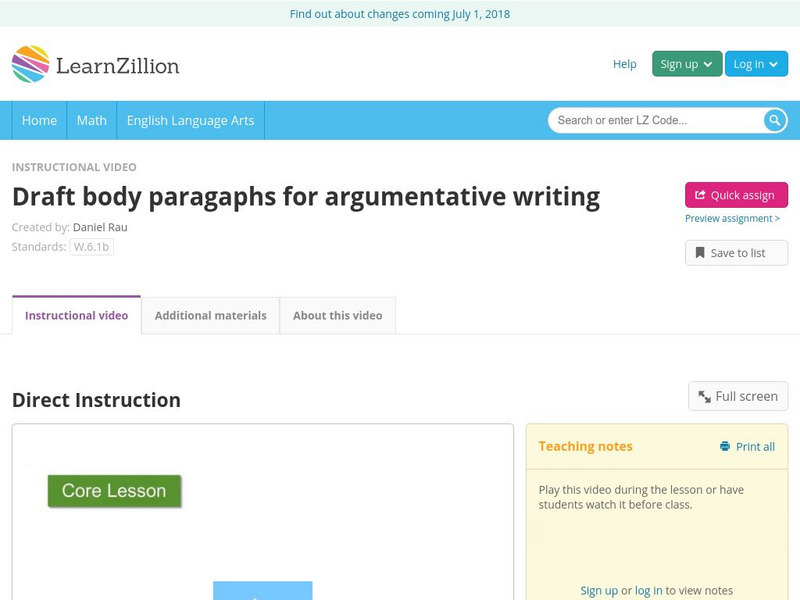Hi, what do you want to do?
PBS
Science Fundamentals: Chemistry!
Chemical reactions are a part of almost everything in everyday life. A video presentation gives an introduction to chemistry by describing the basics of atomic structure and chemical reactions. Learners discover chemical reactions are...
PBS
Taking the Reins: Women in Politics | Idaho Experience
May Arkwright Hutton may not be a familiar name to some but she played a major role in Idaho's Suffrage Movement. An entrepreneur, Hutton used her wealth to promote suffrage. A short video introduces viewers to the work of this...
Lit2Go
The Two Fellows and the Bear
How does trust grow between friends, and why is it so important? Aesop's 142-word fable "The Two Fellows and the Bear," addresses the question and challenges readers to think about whether they should trust the friends in their lives. To...
Lit2Go
The Tortoise and the Eagle
Part of a set of fables, Aesop's "The Tortoise and the Eagle" is all about a tortoise that fulfills his dreams and dies in the process of completing them. The activity after the passage asks readers to write an argumentative response...
Lit2Go
The Labourer and the Nightingale
Young negotiators ponder the best arguments to escape captivity after listening to Aesop's "The Labourer and the Nightingale," which tells the tale of a clever songbird who secures his own freedom. They then respond to a writing prompt...
Lit2Go
The Two Crabs
How important is it to lead with example? Part of a larger series of audiobooks, Aesop's 70-word fable "The Two Crabs" is about a mother crab that essentially tells her son to do what she says and not as she does. The writing activity...
Lit2Go
The Fox and the Lion
Can getting to know someone change your opinion of them? After listening to Aesop's fable "The Fox and the Lion," young writers respond with a short literary analysis on the theme of familiarity.
Lit2Go
The Donkey and the Grasshopper
Patience, young grasshopper ... the lesson provides a great experience with narrative writing using an installment from a series of audiobooks of Aesop's Fables. The 57-word passage leads to an engaging activity where your readers argue...
TED-Ed
Should We Get Rid of Standardized Testing?
Did you know that the concept of standardized testing is over 2,000 years old? But what is the purpose of these tests? What do they supposedly measure? A short video investigates the history of standardized tests.
Townsend Press
Argument
Form well-crafted arguments with the help of an educational video. Fourth graders study various examples of persuasive arguments, including thesis statements and cartoons, and observe the ways that supporting details can enhance the...
Townsend Press
Purpose and Tone
A powerful image or well-placed comment always has intention behind it. Guide young readers through author's purpose and tone with a language arts video that explains why word choice is key in writing clearly and coherently.
Sophia Learning
Sophia: Cause and Effect Papers
This video lesson focuses on cause and effect papers. It begins by defining the terms and purpose for cause and effect writing and then moves on to planning, organizing, and writing the paper. Real Player is required.
Sophia Learning
Sophia: Classification Papers
This video tutorial focuses on a type of informative writing called classification papers. It defines classification writing, provides an organization pattern for the material, and offers a general outline for classification papers.
Imagine Learning Classroom
Learn Zillion: Develop a Claim
In this lesson, you will learn how to generate a precise claim by analyzing your text and notes for reasons and evidence. [7:29]
Imagine Learning Classroom
Learn Zillion: Write a Thesis Statement for an Argumentative Essay
In this lesson, you will draft a thesis statement for your argumentative essay by combining your claim and supporting reasons. [4:47]
Imagine Learning Classroom
Learn Zillion: Draft Body Paragaphs for Argumentative Writing
In this lesson, you will learn how to draft body paragraphs for an argumentative essay by introducing evidence and explaining how it supports your thesis. [4:56]
Imagine Learning Classroom
Learn Zillion: Identify Relevant Evidence
Students will be able to identify relevant evidence in their argumentative writing. [7:12]
Imagine Learning Classroom
Learn Zillion: Write an Argument for a Thesis Statement
In this lesson, you will learn how to write the argument for a thesis statement by turning the purpose statement into a claim. [3:52]
Imagine Learning Classroom
Learn Zillion: Strengthen Argumentative Writing by Identifying an Opposing Claim
In this lesson, you will learn how to strengthen your argument by identifying the opposing claim and arguing against it. [4:34]
Imagine Learning Classroom
Learn Zillion: Clarify How Evidence Supports the Reason
Students will be able to clarify how each piece of evidence supports the reason by writing sentences explaining each piece of evidence. [5:28]
Imagine Learning Classroom
Learn Zillion: Match the Body of a Paragraph to the Introduction
Writers use an introduction to organize the ideas that follow. Let's practice organizing the ideas within a paragraph according to the paragraph's introduction. [7:46]

























